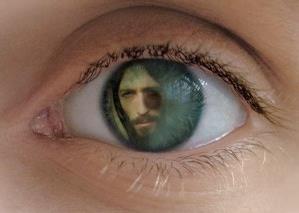Yesterday morning I was working out on my elliptical machine when I felt tiny arms hug me. Startled, I looked back and saw my cat, Little Bear, standing on his hind lets on the cover over the back wheel and hugging me. Awwww. I love my cats and dog. They are all so lovable and interesting. Continue reading
Tag Archives: Yeshua
Eye – Ayin
Since I’ve been writing about eyes and sight lately, I thought I’d share the Hebrew word for eye, which is עין (pronounced AH-yeen).
Matthew 6:22-23 literally reads: “The lamp of the body is the eye. If your eye is good, your whole body is full of light; but if your eye is evil your whole body is full of darkness…”
“If your eye is good” is a Hebrew saying that means, “if you are generous.” If a “good eye” speaks to generosity, what is an evil eye? Someone not knowing the Jewish background might suppose it is speaking of casting spells. But in Hebrew culture, having an “evil eye,” means being stingy – just like having a “good eye,” means being generous. Yeshua (Jesus) is warning against lack of generosity and nothing else. This fits the context perfectly: “Where your treasure is, there will your heart be also….You cannot serve both God and money.”
Crown of Messiah
We study the Scriptures together as a family. We follow the Jewish Scripture reading schedule. Ezra (the one in the Bible) set up this reading schedule, and Jews have been following it ever since–including Jesus. For the past few years, we’ve been using the Hebrew for Christian book, A Year Through the Torah. You can buy a hard copy of the book or access it on line for free by clicking This Week’s Torah Reading in the sidebar at the left. The teaching is tremendous, and we have learned so much through it.
Continue reading
You are to Give Him the Name…
The Hebrew language is filled with word play and puns, using words that are spelled similarly, have the same rhythm in the words, or use different words to repeat a thought. This word play is called “Hebraism” and is found throughout the Old and New Testaments. You can see them in Hebrew but not in English. One example of a Hebraism in the New Testament is found in John 3:8:
Continue reading

You must be logged in to post a comment.